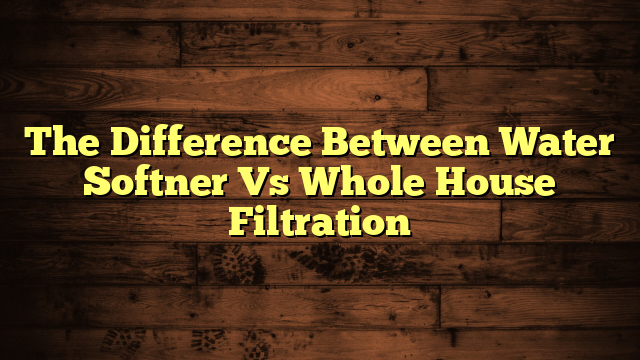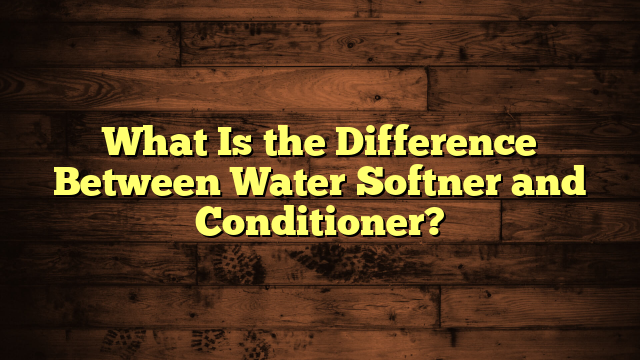The Difference Between Water Softner Vs Whole House Filtration
Imagine standing under a revitalizing shower, feeling the water cascade over you—only to realize it's leaving a film on your skin. That's where the choice between a water softener and a whole house filtration system comes into play. Each serves a unique purpose; one focuses on eliminating hard minerals while the other tackles a broader spectrum of contaminants. You might wonder which system is right for your home and lifestyle, as the implications of your choice extend far beyond just softening water or filtering out impurities.
Key Takeaways
- Water softeners primarily address hardness by replacing calcium and magnesium with sodium ions, while whole house filtration systems remove a wide range of contaminants.
- Whole house filtration ensures clean, safe water at every tap, targeting pollutants like chlorine, heavy metals, and sediments.
- Water softeners improve the feel of water, enhancing skin and hair quality, whereas filtration systems focus on health protection from harmful substances.
- Installation and maintenance costs differ; water softeners are often DIY with lower upfront costs, while filtration systems may require professional installation and regular filter changes.
- Choose a water softener for hardness issues and a whole house filtration system for overall water quality improvement and safety.
Understanding Water Softeners
When it comes to improving your home's water quality, understanding water softeners is essential. Water hardness, caused primarily by minerals like calcium and magnesium, can lead to various issues, from stubborn soap scum to clogged pipes.
A water softener tackles this problem by replacing these hard minerals with sodium ions, making your water softer and more manageable.
One key aspect of water softeners is salt usage. You'll typically need to add salt to the system regularly, allowing it to function effectively.
The amount of salt you use will depend on your water hardness levels and the size of your household. It's important to monitor this, as too little salt can hinder the softener's performance, while too much could lead to unnecessary costs.
Understanding Whole House Filtration
Whole house filtration systems play an essential role in ensuring your water is clean and safe for everyday use.
These systems utilize various filters to remove contaminants, providing benefits that go beyond just taste.
Let's break down the filtration process, explore the types of filters available, and highlight the key advantages of investing in a whole house filtration system.
Filtration Process Explained
How does whole house filtration work to guarantee the water you use daily is clean and safe? This thorough system treats water at the point it enters your home, ensuring every tap delivers filtered water. The filtration process employs various filtration methods to remove contaminants, sediment, chlorine, and even heavy metals.
When water flows through the filtration system, it usually passes through multiple stages. Each stage targets specific impurities, enhancing filtration efficiency. For example, a pre-filter might catch larger particles, while activated carbon absorbs chemical contaminants.
As the water continues through the system, different media work together to tackle a wide range of impurities. This layered approach not only improves the quality of your water but also extends the lifespan of your plumbing and appliances.
Ultimately, whole house filtration provides peace of mind, knowing that every drop of water in your home is treated and safe. By understanding the filtration process, you can appreciate how these systems transform your water supply into a clean, invigorating resource for drinking, cooking, and bathing.
Investing in whole house filtration means investing in your health and home.
Types of Filters
Understanding the types of filters used in whole house filtration is essential for ensuring your water is truly safe and clean. Various filter types employ different filtration methods to tackle specific contaminants.
For instance, sediment filters remove larger particles like sand and silt, helping to protect other filters in your system. Activated carbon filters excel at removing chlorine, volatile organic compounds (VOCs), and unpleasant odors, enhancing your water's taste.
Another important type is the reverse osmosis filter, which uses a semi-permeable membrane to eliminate dissolved solids, heavy metals, and other impurities. This method is particularly effective for improving water quality, but it may require additional storage tanks due to its slower flow rate.
Ultraviolet (UV) filters utilize UV light to neutralize bacteria and viruses, providing an extra layer of protection. While this method doesn't remove physical contaminants, it's vital for ensuring microbial safety.
Lastly, there are whole house filtration systems that combine multiple filter types, optimizing effectiveness.
Benefits of Filtration
Investing in a whole house filtration system brings numerous benefits that enhance your home's water quality.
With improved filtration, you can enjoy several filtration advantages that positively impact your everyday life. Here are four key benefits you can expect:
- Enhanced Water Quality: Filtration systems effectively remove contaminants like chlorine, pesticides, and heavy metals, resulting in cleaner, better-tasting water.
- Health Benefits: By reducing pollutants, you're protecting your family from potential health risks associated with contaminated water, such as gastrointestinal issues and skin irritations.
- Longer-Lasting Appliances: Clean water helps prevent mineral buildup in your appliances, extending their lifespan and saving you money on repairs and replacements.
- Convenience: You'll have access to filtered water at every tap in your home, eliminating the need for individual filters or bottled water, making hydration easy and safe.
Key Differences in Functionality
When it comes to water treatment systems, knowing the key differences in functionality between a water softener and a whole house filtration system can help you make an informed choice for your home.
A water softener primarily addresses water chemistry related to hardness minerals, which are typically calcium and magnesium. It works by replacing these minerals with sodium or potassium ions, reducing scale buildup on pipes and appliances.
On the other hand, a whole house filtration system focuses on removing a broader range of contaminants from your water supply. This system utilizes various filtration methods, such as activated carbon, reverse osmosis, or UV purification, to tackle impurities like chlorine, sediment, and even bacteria.
While a water softener improves the feel of your water and protects your plumbing, it won't necessarily make your water safer to drink.
Understanding these key differences can guide your decision. If you're primarily concerned about hard water issues, a water softener is your go-to solution.
However, if you want cleaner, safer water throughout your home, a whole house filtration system is the better choice. Balancing these priorities guarantees you meet your household's specific water needs effectively.
Benefits of Water Softeners
Why should you consider a water softener for your home? The advantages are numerous, and they can greatly improve your daily life. Here are four key benefits you'll enjoy:
- Reduced Scale Buildup: Water softeners prevent mineral deposits from forming in your pipes and appliances, extending their lifespan.
- Softer Skin and Hair: You'll notice smoother skin and shinier hair when washing with softened water, as it eliminates harsh minerals.
- Easier Cleaning: Softened water reduces soap scum and mineral stains, making cleaning bathrooms and kitchens a breeze.
- Lower Energy Bills: With less scale buildup, your water heater operates more efficiently, potentially reducing your energy costs.
While installation costs can vary, investing in a water softener is often worth it for the long-term savings in maintenance and repairs.
Regular softener maintenance is essential to keep your system running smoothly, but it's generally straightforward. You'll mainly need to check the salt levels and occasionally clean the resin tank.
With a bit of attention, you can enjoy consistent performance and all the benefits that come with softened water.
Benefits of Whole House Filtration
When you consider whole house filtration, you'll quickly appreciate the improved water quality it provides.
This system effectively removes a wide range of contaminants, ensuring that every tap in your home delivers cleaner, safer water.
With these benefits, investing in whole house filtration can greatly enhance your daily life.
Improved Water Quality
Whole house filtration systems greatly enhance water quality, providing you with cleaner, safer water throughout your home. By guaranteeing peak water purity, these systems help maintain the mineral balance essential for your health and daily activities.
You'll notice the difference in various ways, making it a worthwhile investment.
Here are four key benefits of improved water quality from whole house filtration:
- Better Taste and Odor: You'll enjoy fresher-tasting water, free from unpleasant smells, making hydration more enjoyable.
- Healthier Skin and Hair: Filtered water reduces exposure to harsh chemicals, promoting healthier skin and shinier hair during showers.
- Longer-Lasting Appliances: Clean water helps prevent mineral buildup in appliances, extending their lifespan and reducing maintenance costs.
- Safer Cooking and Drinking: Using filtered water for cooking ensures that your meals are healthier, free from contaminants.
Incorporating a whole house filtration system into your home isn't just about convenience; it's about prioritizing your health and well-being.
You deserve access to high-quality water that supports your lifestyle while safeguarding your family's health. It's an essential upgrade that pays off in several ways!
Comprehensive Contaminant Removal
Your home's water supply can harbor a variety of contaminants that pose risks to your health and well-being. Whole house filtration systems excel in providing thorough contaminant removal, guaranteeing that the water you drink, shower in, and use for cooking is clean and safe.
Unlike basic filters, these systems tackle a wide range of impurities, including chlorine, heavy metals, bacteria, and sediment, effectively removing them from your water supply.
When you invest in effective filtration solutions, you're not just improving taste; you're enhancing your overall quality of life. Clean water not only feels better on your skin but also protects your family from potential health risks associated with contaminated water. By filtering out harmful substances, you're taking a proactive step toward safeguarding your health.
Moreover, whole house systems require minimal maintenance compared to individual point-of-use filters, giving you peace of mind. With just one installation, you'll benefit from purified water throughout your home, making it convenient and efficient.
Cost Considerations
Considering the costs associated with water softeners and whole house filtration systems is essential for making an informed decision. When you explore a cost analysis, you'll notice that both options come with unique budget considerations.
Here's a breakdown to help you evaluate your investment:
- Initial Purchase Price: Water softeners typically have a lower upfront cost than whole house filtration systems. However, the price can vary widely based on brand and capacity.
- Installation Costs: Installing a filtration system may require professional help, adding to your overall expenses. In contrast, some water softeners can be DIY-installed, saving you money.
- Maintenance Expenses: Softener systems often need salt replacements, while filtration systems require periodic filter changes. Factor these ongoing costs into your budget.
- Long-term Savings: Consider how each system affects your water quality and household appliances. A water softener can prolong the life of appliances, potentially saving you money over time.
Choosing the Right System
When evaluating the financial aspects of water softeners and whole house filtration systems, it's important to match your choice with your specific needs. Knowing the system features and installation requirements can help you make an informed decision. Here's a quick comparison to guide you:
| Feature | Water Softener | Whole House Filtration |
|---|---|---|
| Purpose | Reduces hardness | Removes contaminants |
| Maintenance | Regular salt refill | Filter replacement |
| Installation | Can be DIY or professional | Often requires professional |
| Cost | Generally lower initial cost | Higher upfront investment |
| Lifespan | 10-15 years | 10-20 years |
When choosing between these systems, consider your water quality, budget, and how much maintenance you're willing to handle. Water softeners excel in preventing scale buildup, which is great for plumbing and appliances. Meanwhile, whole house filtration systems provide clean, safe drinking water throughout your home. Ultimately, the right choice depends on your needs. Take your time, evaluate your options, and you'll find the perfect solution for your household.
Frequently Asked Questions
Can I Install Both a Water Softener and Whole House Filtration?
Yes, you can install both a water softener and a whole house filtration system. You'll enjoy water softener benefits like reduced scale buildup and filtration system advantages, such as cleaner, healthier water throughout your home.
Do These Systems Require Regular Maintenance?
You might think regular maintenance's a hassle, but it's essential for system longevity. Depending on your system, maintenance frequency varies, so staying proactive guarantees peak performance and saves you money in the long run.
How Do I Know Which System I Need?
To determine which system you need, evaluate your water quality and consider system compatibility with your plumbing. Test your water for hardness or contaminants to identify the right solution for your needs and lifestyle.
Will Either System Affect My Water Pressure?
Think of your plumbing like a highway—both systems can affect water pressure. If installed correctly, they enhance system efficiency without significant drops in pressure, ensuring smooth flow just like a well-maintained road.
Can I Use Salt-Free Alternatives for Water Softening?
Yes, you can use salt-free options for water softening. These alternatives offer salt-free benefits like reducing scale buildup without adding sodium to your water, making them a great choice for those concerned about salt intake.
Conclusion
To sum up, choosing between a water softener and a whole house filtration system boils down to your specific needs. If you're looking to tackle hard water issues, a water softener's got your back, but for a broader range of contaminants, a filtration system is the way to go. Think of it like choosing between a trusty sword and a well-rounded shield; both are useful, but each serves a unique purpose in your quest for clean water.







